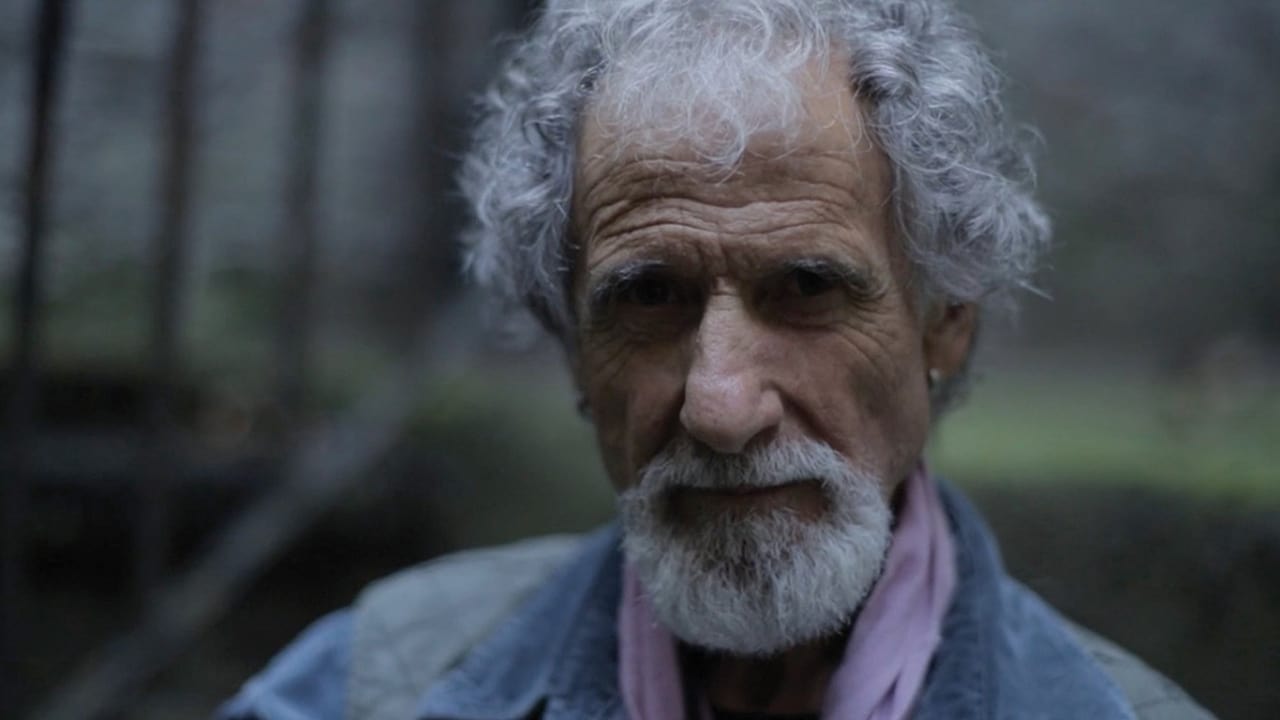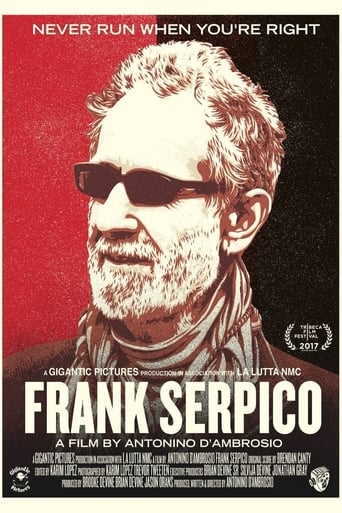

In this documentary we see an aging Frank Serpico, former NYPD police officer, relive his experiences as a Police Officer in New York City during a period when corruption was rampant in the department, and crime was high. In viewing this documentary one would get the most out of it by reading the book and watching the movie Serpico as well. If you are a history of public administration student, or are interested in politics, I recommend watching video of the Knapp Commission which was formed by Mayor John Lindsey to look into police corruption in the department. This documentary is slow and at times does not seem to follow a logical script, but it is valuable given the subject at hand. I think one of Serpico's greatest challenge is living up to Al Pacino's performance.
... View MoreThis film kind of assumes the viewer has at least some familiarity with what Frank Serpico is known for: Instead, it's more interested in painting a picture of *who* he is. Lots of scenes show Serpico, a lanky and animated guy in his early 80s, vividly recounting his experiences on prostitution stings, working as a plainclothes cop, and then eventually being transferred to the narcotics division. He speaks of his family and their working-class Italian background, along with the pressure he faced to stay silent in the face of widespread bribery and corruption in the NYPD in the '70s. The famous incident where he was shot and received little backup (it was suspiciously only called in by a civilian as a 10-10 - "possible crime" - rather than by a fellow officer as a more serious 10-13 - "assist patrolman") is also discussed.The film flatters and is very much in awe of him; if you hate Serpico for whatever reason then there's really no reason for you to watch this. Still, the film does attempt to address some of the knee-jerk criticisms ("he's a rat," etc.) mostly by way of Arthur Cesare. He's a retired detective and one-time partner of Serpico's in the narcotics division; he criticizes Serpico to his face for going after the little guys instead of the big bosses who enabled the corrupt behavior which, he also admits, was rampant in the '70s. The film is quick to point out that, as reiterated in the Knapp Commission, Serpico didn't want to wear a wire to record conversations with patrolmen - he too mainly wanted the upper-level rotten apples."Get the bosses," Cesare admonishes. "Because without their okay, it will not happen.""How do you lock up the boss? How do you go after these guys?" Serpico asks.After a long pause, Cesare says he doesn't know. "I didn't even try," he admits.I wanted more voices like Cesare's in the film - real cops, retired or not, who disagree with Serpico or even outright hate him. It would've given the film a chance to respond to some of their criticisms, most of which seem to crumble under the harsh light of scrutiny.The film winds down with some info about the production of the famous "Serpico" movie starring Al Pacino and directed by Sidney Lumet; the real-life Serpico clashed with the director and was uninvited from the set (John Avildsen was going to direct but was apparently let go by the studio before production got underway).Ultimately the film paints a picture of a regular, working-class guy with some hippie tendencies (Serpico is big into zen) who regarded any semblance of corruption in the force as a personal affront to his sense of morality. The film sees him as almost Christ-like in his ordinariness, though Serpico himself admits he's kind of eccentric.I saw him as a good guy who, while he did cash in on his fame, is still important in the annals of police history for the anti-corruption work he did.This documentary could've been more incisive, but it's still pretty good. Worth a watch!
... View MoreThe story of Frank Serpico is part heroic, part tragic and part odyssey.Serpico was a young policeman in New York in the sixties and early seventies. He saw widespread corruption in law enforcement (officers taking bribes, etc.) and his sense of honour and his moral code was offended. But his response did not stop there. He took action. He reported the moral decay he witnessed to his superiors and testified repeatedly to lawmakers to try to initiate change and reform. He stuck his neck out when many others who might be equally disturbed by the corruption around them would not have had the courage to do so.And it cost him. Big time. Serpico was ostracized, his life was imperiled and the toll it took on him mentally and physically, was and continues to this day to be, siginificant.This new documentary by Antonio D'Ambrosio attempts to show Frank Serpico, warts and all. Through extensive interviews with Serpico and former friends and colleagues (not to mention enemies) as well as clips from the Al Pacino Oscar-nominated film SERPICO, Serpico's epic journey from rookie to celebrity to chump to whistle blower to outcast and to celebrity is vividly conveyed, sometimes with alarming frankness. One hand-shaking, slap on the back reunion with a former colleague soon deteriorates into an uncomfortable trip down memory back lane when it becomes apparent that the former colleague of Serpico's was one of his detractors. And while it's all water under the bridge now, to this fellow's credit he doesn't back off from his criticisms of Serpico and his relentless drive to expose the New York Police Department as a den of corruption.One excellent choice by director/producer/writer D'Ambrosio is his use of clips from the Pacino film. Why use re-enactments when you've got the scenes you want already intact, directed by no less a director than the great Sidney Lumet? Anything less than Lumet's gritty, '70's-era approach would have paled by comparison.Where the film takes a tragic turn is when it becomes obvious that Frank Serpico's bull-headed integrity has taken a terrible toll on him. He truly suffers from PTSD and might even be seen to be a little crazy. D'Ambrosio wisely does not comment, but lets the viewer decide for himself if and how much Serpico is mentally disturbed by his experiences.Was what Serpico did necessary? To him, yes. Was his approach the best? For him, yes. Was the cost to his physical and mental well-being too great? You decide.When you live by the credo "Never run when you're right" it is bound to cost. Even when motivated by the unique type of stubborn moral integrity possessed by Frank Serpico, not everyone is going to admire what you do and how you do it. Very few of us could do what Frank Serpico did. Not everyone would want to. This outstanding film shows the rightness, the wrongness, and the everything in between-ness of the cost of personal integrity and morality.
... View MoreGreetings again from the darkness. Deciding whether a whistleblower is a hero or a "rat" usually depends on which side of the issue you fall. The line is not quite so clear in the case of Frank Serpico, the New York cop who exposed massive corruption in that city's police department in the late 1960's and early 1970's. Of course the crooked cops vilify him as a rat, but even the good cops are divided some believing a cop should never break ranks and go against another cop.After testifying in 1972, Frank Serpico left it all behind (spending time in Holland). It's now 45 years later, and director Antonino D'Ambrosio allows him to tell his own story directly to the camera. If you have seen the 1973 film SERPICO (directed by Sidney Lumet and starring Al Pacino), you will recognize some of the referenced stories and situations, and realize how closely the movie followed the Peter Maas book. Despite his theatrical nature – he seems to be a thespian at heart – Mr. Serpico is so committed to truth that we find it difficult to question much of what he says. This is a man that yelled "cut" during the filming of a scene in the movie he claims the events depicted in the scene never happened, so they shouldn't be part of the movie. Yes, he was then banned from the set.Serpico's stories are irresistible and we are captivated by the charm and personality of the now 81 year old who seems both at peace with the past, and crystal clear on what it has meant to his life. There can be a fine line between hero and villain, and sometimes the legend holds up when the facts are known. Through the years, Serpico has remained true to his ideals the same ideals that were present when he was a kid working at his immigrant father's shoe shine store. The film's presentation is terrific as Serpico takes us on a tour of that old family business (now a diner), his childhood home, and old Greenwich Village apartment. He then meets up with Arthur Cesare, one of his partners that fateful night of February 3, 1971. A drug bust resulted in Frank being shot in the face and leading to questions of a set-up and slow police response. These are straight talking New Yorkers who uncharacteristically dance around the topic, leading us to believe there is something to the rumor. It's a powerful segment.The clips and photographs take us back to that era, and there are interviews from neighbors, friends, partners, Ramsey Clark (his attorney), journalists, writers, and other cops. It seems clear that payoffs were "part of the scene", and that some cops were simply too afraid to not go along. We see the distinctive New York magazine cover showing Serpico's skull with the bullet visible in the x-ray. Actor John Turturro describes him as an inspiration, while others state Serpico suffers from PTSD (who could blame him?)."Never run when you're right." That's the fatherly advice Frank says he got from his father, and what we see on screen is a man who refused to accept the corruption of an institution he believed should be above it all. He accepts the hate from those who see him as anything but true blue, and also refuses to see himself as the hero who stood up when someone needed to. On what side of the line do you fall?
... View More